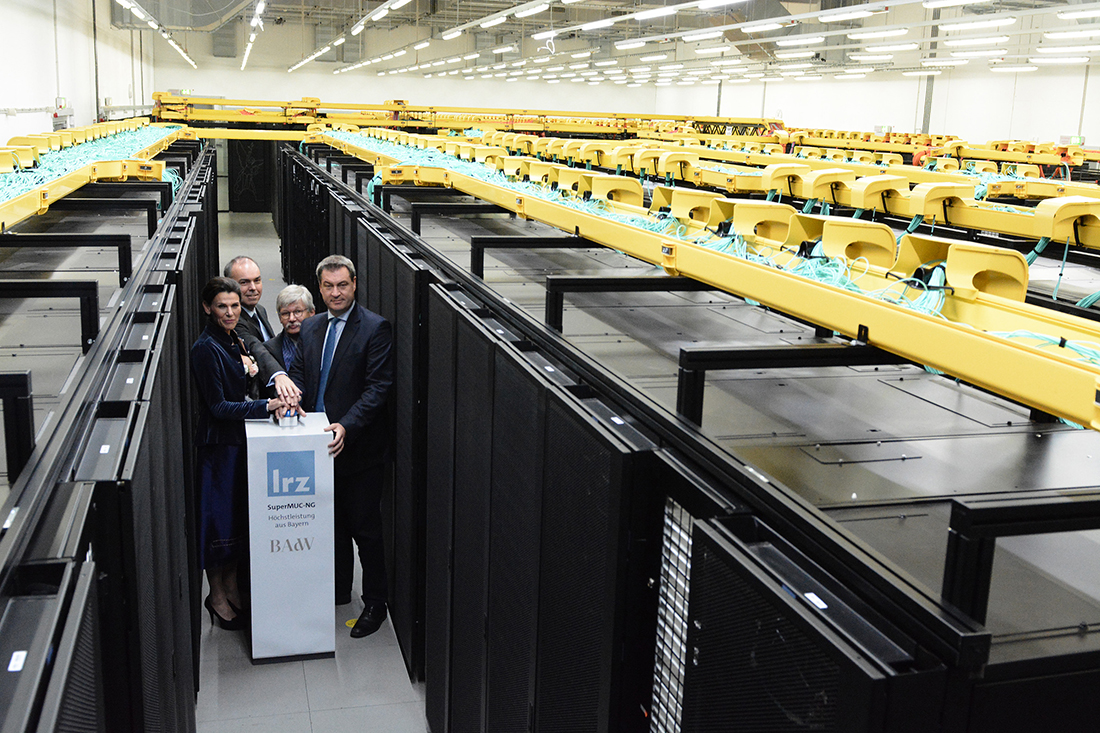PRESS RELEASES
LRZ, Lenovo, and Intel Earn HPCwire Editors’ Choice Award for Energy-Efficient HPC
Press Release 08/2018 –
BERLIN, Germany, Nov. 15, 2018—On Nov. 12, 2018, trade magazine HPCwire announced the winners of its annual Readers’ and Editors’ Choice awards. The awards, presented this year at this year’s Supercomputing Conference (SC18) in Dallas, Texas, recognize outstanding technical and scientific achievements at high-performance computing (HPC) centres. The Leibniz Supercomputing Centre’s (LRZ’s) most recent addition to its HPC portfolio, SuperMUC-NG, earned the centre and its partners, Lenovo and Intel, the Editor’s Choice award in energy efficient HPC use.
When installation is complete, SuperMUC-NG will be the largest homogenous, non-accelerated HPC system in the world, with an expected peak performance of 26.9 petaflops. Despite the jump in performance, SuperMUC-NG is actually more efficient than its predecessor, SuperMUC Phases 1 and 2. LRZ has been a driving force in energy efficient HPC, ensuring that each successive supercomputing would be designed with energy efficiency and reuse in mind. Green IT has long been an important topic at the centre, and a central part of LRZ’s research focus, ultimately ensuring that the centre’s overall energy consumption was consistently being kept to a minimum.
“Energy-efficiency is a very important aspect in our work, not only to reduce the impact on our environment, but also to save on operational costs,” said Prof. Dr. Dieter Kranzlmüller, Director of LRZ. “Every Euro saved on energy can be spent on more computation for science. This means, if we save money on energy, we can do more science.” Due to the centre’s dedication to “green” HPC in the procurement process, LRZ has helped blaze the trail for more efficient HPC and serves as a thought-leader in energy efficient supercomputing.
The HPCwire editorial team clearly acknowledged the centre’s commitment to energy efficiency, pointing out that by using direct warm-water cooling for the system, and then using that heated water to help heat the centre as well as helping produce cold water using adsorption coolers, SuperMUC-NG makes LRZ the most effective HPC centre in the world for energy reuse.
SuperMUC-NG was financed 50-50 by the Federal Government of Germany and the Free State of Bavaria under the auspices of the Gauss Centre for Supercomputing. It is currently in the start-up phase, and will be available for production in early 2019.
About GCS: The Gauss Centre for Supercomputing (GCS) combines the three German national supercomputing centres HLRS (High Performance Computing Center Stuttgart), JSC (Jülich Supercomputing Centre), and LRZ (Leibniz Supercomputing Centre, Garching near Munich) into Germany’s integrated Tier-0 supercomputing institution. Together, the three centres provide the largest, most powerful supercomputing infrastructure in all of Europe to serve a wide range of academic and industrial research activities in various disciplines. They also provide top-tier training and education for the national as well as the European High Performance Computing (HPC) community. GCS is the German member of PRACE (Partnership for Advanced Computing in Europe), an international non-profit association consisting of 24 member countries, whose representative organizations create a pan-European supercomputing infrastructure, providing access to computing and data management resources and services for large-scale scientific and engineering applications at the highest performance level.
GCS is jointly funded by the German Federal Ministry of Education and Research and the federal states of Baden-Württemberg, Bavaria, and North Rhine-Westphalia. It is headquartered in Berlin, Germany. For more information, please visit www.gauss-centre.eu.
Contact:
Eric Gedenk, GCS Public Relations
+49 711 685-87241
e.gedenk@gauss-centre.eu
This press release as a pdf.
